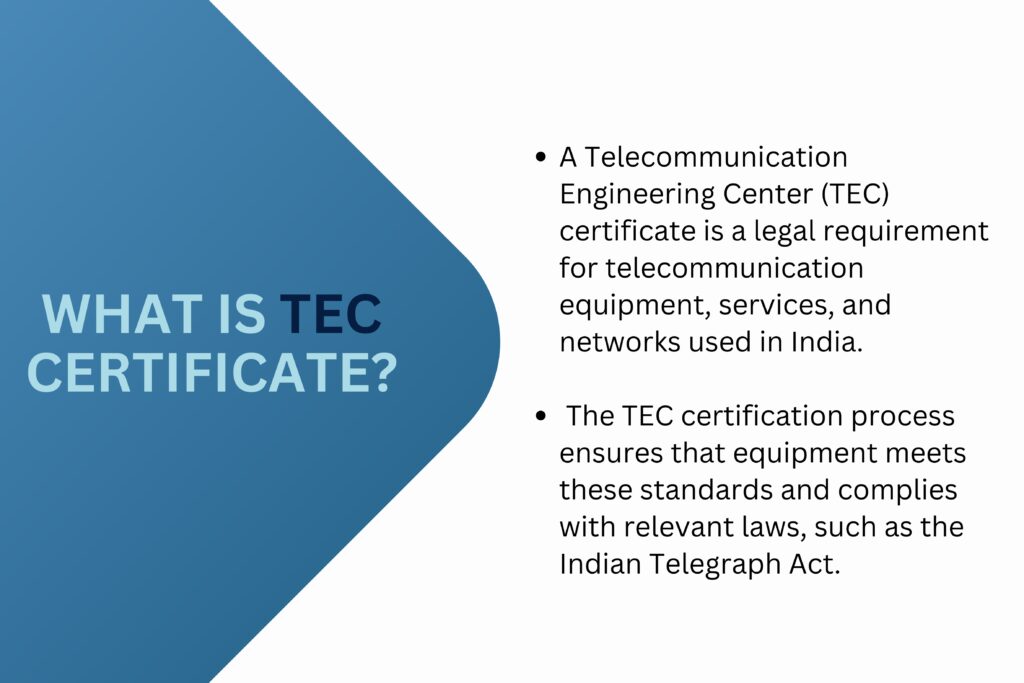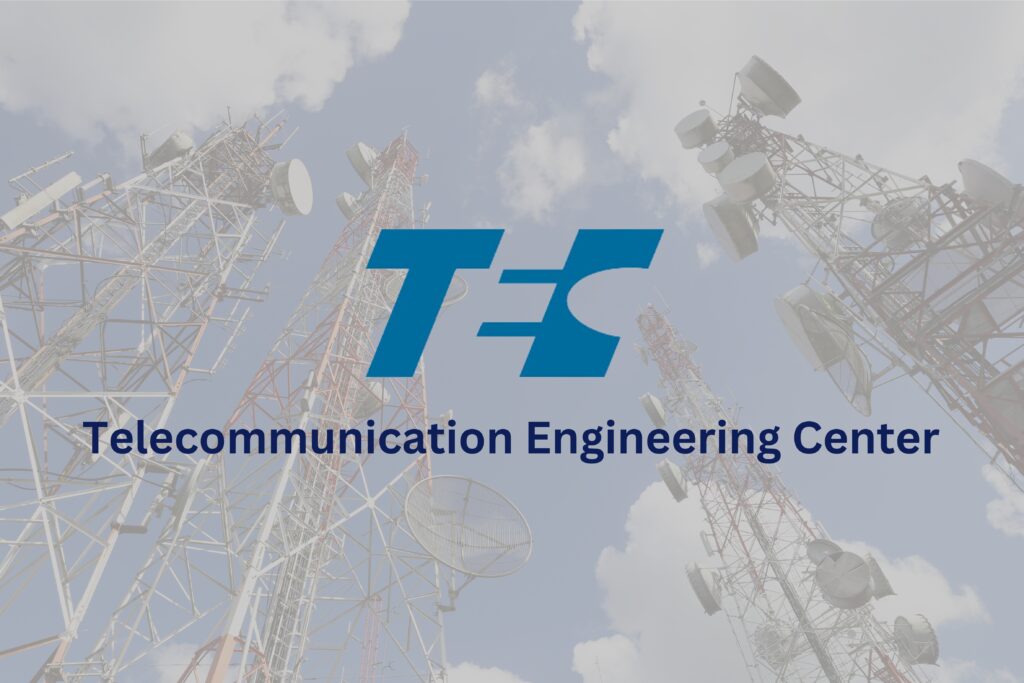TEC CERTIFICATION FOR TELECOM PRODUCTS
 The Department of Telecommunications (DoT), under the Ministry of Communications in India, has mandated the testing and certification of telecommunication equipment through the “Indian Telegraph (Amendment) Rules,” which were notified in the Gazette of India on 5th September 2017 (G.S.R. 1131(E) PART XI). Here are the key points regarding this mandatory testing and certification requirement:
The Department of Telecommunications (DoT), under the Ministry of Communications in India, has mandated the testing and certification of telecommunication equipment through the “Indian Telegraph (Amendment) Rules,” which were notified in the Gazette of India on 5th September 2017 (G.S.R. 1131(E) PART XI). Here are the key points regarding this mandatory testing and certification requirement:
Legal Framework:
Indian Telegraph (Amendment) Rules: These rules amend the Indian Telegraph Rules, 1951, to include provisions for mandatory testing and certification of telecommunication equipment.
Authority: The mandatory testing and certification requirement applies to any telegraph equipment that is used or capable of being used with any telegraph established, maintained, or operated under a license granted by the Central Government under the Indian Telegraph Act, 1885.
Purpose: The primary purpose of mandatory testing and certification is to ensure that telecommunication equipment meets prescribed technical parameters and standards set by the telegraph authority (DoT). This is crucial for ensuring the reliability, interoperability, and security of telecommunication networks and services in India.
Implementation:
Testing and Certification Process: Telecommunication equipment manufacturers or importers must undergo prior testing and certification for their products.
Parameters and Standards: The specific parameters and standards for testing and certification are determined by the telegraph authority (DoT) and may be updated periodically to reflect technological advancements and regulatory requirements.
Compliance: Compliance with the mandatory testing and certification requirement is mandatory for telecommunication equipment to be legally used in conjunction with licensed telegraph services in India.
Impact:
Consumer Protection: Ensures that telecommunication equipment available in the market meets minimum quality and safety standards, thereby protecting consumers and ensuring the reliability of telecommunication services.
Regulatory Oversight: Strengthens regulatory oversight by the Department of Telecommunications over telecommunication equipment, fostering a secure and efficient telecommunication ecosystem in the country.
Industry Compliance: Manufacturers and importers need to comply with these rules to legally market their telecommunication equipment in India, fostering fair competition and technological advancement in the sector.

Objectives of MTCTE:
Lorem ipsum dolor sit amet, consec
Network Performance: Ensure that telecommunication equipment does not degrade the performance of existing networks to which it is connected. This objective emphasizes interoperability and compatibility with established telecommunication infrastructure.
Safety of End-Users: Guarantee the safety of end-users who utilize telecommunication equipment. This includes ensuring that the equipment does not pose hazards or risks to users during its operation.
RF Emissions Control: Protect users and the general public by ensuring that radio frequency (RF) emissions from equipment do not exceed prescribed standards. This objective aims to mitigate potential health risks associated with RF exposure.
Compliance with Regulatory Standards: Ensure that telecom equipment complies with relevant national and international regulatory standards and requirements. This includes technical specifications, protocols, and performance criteria established by regulatory authorities.
tetur adipiscing elit. Ut elit tellus, luctus nec ullamcorper mattis, pulvinar dapibus leo.
What is TEC Certification?
TEC Certification, also known as Telecom Engineering Centre Certification, refers to the process of certifying telecommunication equipment under the regulations and standards prescribed by the Telecom Engineering Centre (TEC) in India. TEC, under the Department of Telecommunications (DoT), is responsible for setting technical standards and specifications for telecommunication equipment and ensuring their compliance through testing and certification.
Key Aspects of TEC Certification:
Regulatory Framework: TEC Certification is governed by the Indian Telegraph Rules and other relevant regulations enforced by the Department of Telecommunications (DoT). These rules mandate that certain categories of telecommunication equipment must undergo mandatory testing and obtain certification from TEC before they can be marketed or used in India.
Essential Requirements: TEC Certification verifies that telecommunication equipment meets the Essential Requirements defined by TEC. These requirements cover various aspects such as electromagnetic compatibility (EMC), safety, performance, and reliability standards.
Testing and Evaluation: Telecommunication equipment undergoes rigorous testing and evaluation as per the testing procedures specified by TEC. The tests ensure that the equipment complies with technical parameters, operational requirements, and regulatory standards set by TEC.
Scope: TEC Certification applies to a wide range of telecommunication equipment including but not limited to:
- Network equipment (routers, switches, modems)
- Terminal equipment (phones, fax machines)
- Radio communication devices (wireless routers, mobile handsets)
- Transmission equipment (optical fibers, microwave systems)
Compliance: Manufacturers and importers of telecommunication equipment must ensure compliance with TEC standards and obtain TEC Certification before commercializing their products in India. This certification assures consumers, network operators, and regulatory authorities that the equipment meets the required standards for safety, performance, and compatibility with Indian telecommunication networks.
In essence, TEC Certification plays a crucial role in ensuring the quality, safety, and regulatory compliance of telecommunication equipment in India. It facilitates the orderly deployment of telecommunication technologies while safeguarding consumer interests and maintaining the integrity of telecommunication networks in the country.
Which are the products covered under TEC Certification?
- The Telecom Engineering Centre (TEC) in India mandates the testing and certification of various telecommunications products to ensure they meet essential standards and regulatory requirements. Here’s a breakdown of the types of products that fall under TEC certification obligation:
- Cordless Phones: Wireless telephones that operate using radio frequencies rather than traditional telephone lines.
- DSL Devices: Equipment used in Digital Subscriber Line (DSL) networks to provide high-speed internet access over telephone lines.
- Communication Devices with Microwaves: Equipment utilizing microwave technology for communication purposes, such as microwave radios or microwave transmitters/receivers.
- IoT Gateway: Devices that serve as gateways for Internet of Things (IoT) applications, facilitating communication between IoT devices and the internet or other networks.
- Modems: Devices used to modulate and demodulate digital signals for transmission over telecommunications lines. This includes DSL modems, cable modems, etc.
- Executive Phone Systems: Sophisticated telephone systems designed for use in business or executive environments, offering advanced features and capabilities.
- NSD / ISD Coin Phones: Public telephones that accept coins for making National and International Subscriber Dialing (NSD/ISD) calls.
- Telephones with 2 Lines: Telephones capable of handling two separate telephone lines or extensions.
- Pay Phones: Public telephones that require payment (coins or cards) for making calls.
- Terminals for Connection to the Public Telephone Network: Devices used to connect end-user equipment (such as telephones or modems) to the public telephone network.
- CLIP Phones: Caller Line Identification Presentation (CLIP) phones that display the caller’s telephone number or name on a screen.
- G3 Fax Machines: Fax machines compliant with Group 3 fax standards, used for transmitting documents over telephone lines.
- ISDN Customer Premises Equipment (CPE): Equipment used at the customer’s premises to connect to Integrated Services Digital Network (ISDN) services, providing digital telephony and data services.
- Private Automatic Branch Exchange (PABX): Private telephone systems within an organization that automatically route calls and manage internal communications.
- Electronic Telephone Instruments: Standard electronic telephones used for voice communication, including basic desk phones and wall-mounted phones.
- Key Telephone Systems: Telephone systems that allow users to directly select lines and perform call handling functions using keys or buttons.
Validity of TEC Certification?

The validity period of TEC (Telecommunication Engineering Centre) Certification in India is typically five years. However, there are specific considerations for Foreign Original Equipment Manufacturers (OEMs) regarding the duration of the certificate:
Standard Validity: For most cases, the TEC Certificate is valid for a period of five years from the date of issue. During this period, the certified equipment can be legally marketed and used in India, provided it complies with all relevant standards and requirements.
Foreign OEMs: For Foreign OEMs, the validity of the TEC Certificate may be tied to the duration of other agreements or documents such as:
- Memorandum of Understanding (MOU): If the equipment was certified under the terms of an MOU between the OEM and Indian authorities, the certificate’s validity might align with the duration specified in the MOU.
- Agreement for Import of Restricted Items (AIR): In cases where the import of the equipment is regulated under an AIR letter, the TEC Certificate’s validity could be linked to the expiration date of the AIR.
Renewal and Compliance: It’s important for OEMs to monitor the validity of their TEC Certificates and initiate renewal processes as necessary to maintain compliance with Indian regulatory requirements. This may involve submitting updated documentation and test reports to demonstrate continued adherence to standards and specifications.

